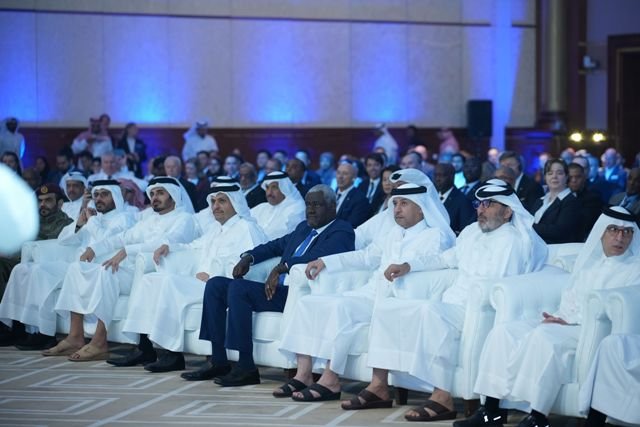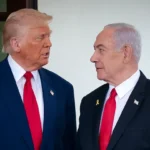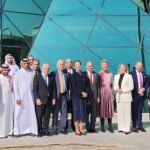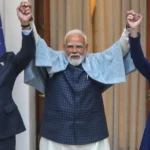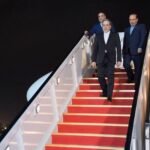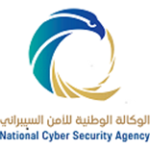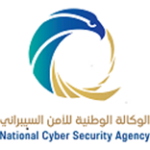Doha, 13 March 2023
Qatar’s Prime Minister and Minister of Foreign Affairs, Sheikh Mohammed bin Abdulrahman Al-Thani today opened the 5th Global Security Forum (GSF) with a call for a sustainable framework for peace and stability.
The 3-day conference is organised by Soufan Center in collaboration with Qatar International Academy for Security Studies at the Hotel Sheraton Grand Doha.
Addressing by-invite only gathering of ministers, government officials, security agency chiefs, law enforcement, academia, media, and the private sector to address complex global security challenges, His Excellency stated that the Forum underlined Qatar’s emphasis on international security dialogueat national, regional, and global levels.
The Prime Minister said the increasing challenges the work is facing extend beyond geo-political conflict and demanded a new sustainable framework for peace and stability.
“What we are seeing today, in terms of the politicization of basic commodities, including food, energy, and pharmaceutical products isn’t any less dangerous than conflicts and war, considering its catastrophic repercussions on more vulnerable nations,” he said.
He said that the proposed new framework would need to be based on “civil dialogue and mutual respect, and non-interference with internal affairs.” He added that such a framework would facilitate national ambitions, and address economic and supply chain stability,
“The State of Qatar has taken early and significant steps in that direction, emanating from its belief in the importance of boosting national production of basic commodities and the diversification of supply chains towards our national security,” he said.
The Prime Minister said achieving food and energy security was a top priority for Qatar and the nation has made huge progress through implementing strategic projects and increasing its national productivity capacity and is now sharing its experience with other nations.
He added: “The challenges facing the world today, since the outbreak of the current energy crisis and its impact on various regions and parts of the world, and what it has caused in terms of energy insufficiency, inequality, and absence of security, calls for an unprecedented international attention.
“Hence, it is paramount that we adopt a realistic, pragmatic approach in dealing with energy insufficiency and put in place balanced policies that protect the environment while providing energy security fairly and for all.”
The Prime Minister stressed that Qatar, now the world’s largest LNG exporter, is working with partners globally to ensure “the continuous and fair provision of energy across the world.”
“We have also worked on providing energy to European countries during the current crisis and will continue to in the coming years.We are confident that natural gas will play an instrumental role in the responsible transformation of the energy sector. Within this framework, the State of Qatar is working on increasing its LNG production capacity from 77 to 126 million tons by 2026 – to provide the world with cleaner and safer energy.”
The Prime Minister emphasized that Qatar, with a foreign policy based on cooperation and solidarity in facing shared challenges, stood ready to be a mediator for conflict resolution.
“While we continue to march towards realizing the Qatar National Vision 2030, our mediation and conflict resolution efforts in Darfur, Lebanon, Afghanistan, Chad, and other regions come to light. This unique approach has poised Qatar as a prominent partner in peacebuilding and supporting stability – and we will continue this active role in the region and internationally towards reducing the impact of regional and global crises and to addressing the challenges we’re currently facing,” he asserted.
He added that the country’s developmental and humanitarian efforts include supporting other countries to reinforce their institutional capacity for comprehensive sustainable development, in line with the UN’s 2030 Agenda for Sustainable Development.
The Prime Minister also said his nation’s hosting of the 2022 World Cup had sent a message of peace and harmony from Qatar and the Arab region to the world and had proved to be an exceptional opportunity for exchange among the nations regardless of their color, culture, and beliefs.
Later Rwandan President, Paul Kagame asserted that the conflict in the Eastern Democratic Republic of Congo (DRC) did not start with his country and that the situation is exacerbated by external actors.
In a fireside chat at the Forum, which is being held under the theme ‘Reshaping the Global Order,’ President Kagame stated emphatically: “Rwanda did not start this crisis, it has been dragged into it because of different reasons.”
The President went on to challenge the U.S. stance which has criticized Rwanda for supporting the M23 rebels in Eastern DRC – an accusation Rwanda has denied.
The President said he had confidence that regional African mechanisms could resolve the issue providing external interference ceased and allowed the root causes to be addressed. “It is not a military problem, it is a political problem,” he stated.
Meanwhile, in a fireside chat, Ms. Larissa Knapp, Executive Assistant Director, Federal Bureau of Investigation (FBI) addressed the evolution of terrorism and other threats, the importance of partnerships, the rising threat of disinformation and online radicalization, facets of transnational repression, tensions with China, the repercussions of the crisis in Ukraine, the future of law enforcement and its role in protecting intellectual property.
Ms. Knapp said the FBI is, for the first time, fighting terrorism on multiple fronts –internationally, domestically, and state-sponsored terrorism and identified local and foreign partnerships as key to identifying bad actors. She highlighted a rising global threat of individuals being radicalized online – some as young as 13 – whether as lone actors or in affiliation with well-known groups, which has seen many countries shift their counter-terrorism resources to address counterintelligence threats. The FBI, she explained is shifting its resources towards dealing with state actors to underscore its commitment to the counter-intelligence fight and is exercising due diligence in the targeted surveillance of suspects outside the U.S. and transparency over the methods used.
Ms. Knapp emphasized the importance of building trusted relationships to help corporations and academia understand the tools through which they could protect their intellectual property and balance it with a desire for information sharing.
She also said success in addressing the 21st century’s changing law enforcement landscape would be in leveraging the strengths of individual agencies as evidenced by the Joint Terrorism Task Force post-911.
US To Remain World Security Leader
Robert C. O’Brien, former US Ambassador, Co-Founder & Chairman, American Global Strategies, LLC, and former U.S. National Security Advisor said he believed that the U.S. would provide world security leadership for the coming century and that the country is continuing to increase its defense industrial output.
The Ambassador sounded an optimistic note for the world’s future, pointing to a stronger NATO with the accession of Finland and Sweden in the wake of the Russia-Ukraine crisis and the impact of the Abraham Accords, which he said he would like to see Qatar and Saudi Arabia join.
However, the Ambassador warned that the U.S.’s growing opioid addiction problem, which is now claiming up to 100,000 American lives a year, could demand a military response. Addressing the issue of 90% of the ingredients of fentanyl – the synthetic opioid – being supplied by China and being routed to the U.S. by Mexican cartels, the Ambassador said: “These are powerful cartels which are going to have to be dealt with in a military fashion that will happen sooner rather than later.”
Ambassador O’Brien referred to two congressmen who have introduced new authorizations for military intervention in Mexico where, he said, the police had failed to deal with cartels which had now established no-go areas and engaged in the kidnapping of Americans. He added that diplomacy would also have a role to play. “Obviously it’s going to have to be handled with diplomacy with the Mexicans. Mexico is not going to like it – they believe in sovereignty, as we do, but we would be doing the Mexican government a favor it we kick out these cartels.”
The Ambassador also said action would be needed to halt the Chinese precursor trade by identifying the shipping which is taking fentanyl to Mexico and having them turned around.
Fostering Energy Security
And in a panel session devoted to fostering energy security amidst shifting geopolitical dynamics, Dr. Damilola Olayuyi, Professor and UNESCO Chair on Environmental Law and Sustainable Development at HBKU College of Law said the Ukraine-Russia conflict had highlighted the need to diversify energy sources.
He added that the pace at which new sources are developed should be stepped up to increase the reliability of energy and to counter climate change. Meanwhile, Dr. Carolyn Kissane, Assistant Dean, New York University Center for Global Affairs pointed to the issues of US allies, such as India, buying oil at discounted prices and there being no sign of secondary sanctions happening.
The 2023 Global Security Forum focuses on international approaches to conflict, crises, and cooperation and includes discussions on the global energy crisis and approaches to strengthening sustainable economies; power competition shaped by the Ukraine crisis, the role of the UN Security Council; the evolution of global terrorism and emerging threats; future prospects for Afghanistan, violent far-right extremist networks and financing; and the disinformation-terrorism nexus.

